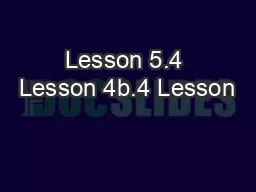PPT-Lesson 6.1: Tighter British Control
Author : stefany-barnette | Published Date : 2016-06-25
How did new British laws lead to greater tension between Parliament and American colonists Vocabulary describe give details about revenue income for the government
Presentation Embed Code
Download Presentation
Download Presentation The PPT/PDF document "Lesson 6.1: Tighter British Control" is the property of its rightful owner. Permission is granted to download and print the materials on this website for personal, non-commercial use only, and to display it on your personal computer provided you do not modify the materials and that you retain all copyright notices contained in the materials. By downloading content from our website, you accept the terms of this agreement.
Lesson 6.1: Tighter British Control: Transcript
Download Rules Of Document
"Lesson 6.1: Tighter British Control"The content belongs to its owner. You may download and print it for personal use, without modification, and keep all copyright notices. By downloading, you agree to these terms.
Related Documents














